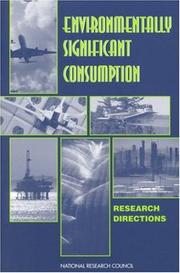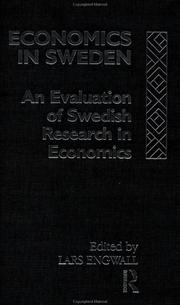| Listing 1 - 9 of 9 |
Sort by
|
Book
ISBN: 3161636139 Year: 2024 Publisher: [s.l.] : Mohr Siebeck GmbH & Co. KG,
Abstract | Keywords | Export | Availability | Bookmark
 Loading...
Loading...Choose an application
- Reference Manager
- EndNote
- RefWorks (Direct export to RefWorks)
***

ISBN: 0309055989 0309523419 0585030723 9780585030722 0309073839 9780309073837 9780309055987 0305055989 Year: 1997 Publisher: Washington, D.C. National Academy Press
Abstract | Keywords | Export | Availability | Bookmark
 Loading...
Loading...Choose an application
- Reference Manager
- EndNote
- RefWorks (Direct export to RefWorks)
Consumption (Economics) --- Environmental policy --- Research. --- Consumption (Economics) -- Research. --- Environmental policy -- Research. --- Economic Theory --- Business & Economics --- Research --- Environmental policy research --- Consumer demand --- Consumer spending --- Consumerism --- Spending, Consumer --- Demand (Economic theory) --- Consumption (Economics) - Research. --- Environmental policy - Research.

ISBN: 0415155126 0415155134 9786610318339 0203443551 1134732104 1280318333 0203276442 0203443543 1134732163 1280318325 1134732171 0585452393 0429231970 1134732090 9781134732166 9781134732173 9780415155120 9780203276440 9780203443552 0203751795 9780203751794 9780415155137 9780585452395 0203751787 9780203751787 9780203443545 9781134732128 Year: 1997 Publisher: London Routledge
Abstract | Keywords | Export | Availability | Bookmark
 Loading...
Loading...Choose an application
- Reference Manager
- EndNote
- RefWorks (Direct export to RefWorks)
This volume includes articles by Wicksell previously unavailable in English, covering his contributions to marginalism and capital theory; public economics and unemployment.
Economics --- Economic schools --- Economics -- Research. --- Economics. --- Money. --- Economic Theory --- Business & Economics --- Economic theory --- Political economy --- Social sciences --- Economic man --- E-books --- Social sciences.
Periodical
ISSN: 26215918
Abstract | Keywords | Export | Availability | Bookmark
 Loading...
Loading...Choose an application
- Reference Manager
- EndNote
- RefWorks (Direct export to RefWorks)
economics --- quantitative economics --- economics research --- quantitative methods --- econometrics --- Development economics --- Economics --- Economic development --- Economic theory --- Political economy --- Social sciences --- Economic man
Book
ISBN: 9780691144009 0691144001 9786613101525 1400838851 1283101521 9781400838851 6613101524 Year: 2011 Publisher: Princeton, NJ
Abstract | Keywords | Export | Availability | Bookmark
 Loading...
Loading...Choose an application
- Reference Manager
- EndNote
- RefWorks (Direct export to RefWorks)
The Poverty of Clio challenges the hold that cliometrics--an approach to economic history that employs the analytical tools of economists--has exerted on the study of our economic past. In this provocative book, Francesco Boldizzoni calls for the reconstruction of economic history, one in which history and the social sciences are brought to bear on economics, and not the other way around. Boldizzoni questions the appeal of economics over history--which he identifies as a distinctly American attitude--exposing its errors and hidden ideologies, and revealing how it fails to explain economic behavior itself. He shows how the misguided reliance on economic reasoning to interpret history has come at the expense of insights from the humanities and has led to a rejection of valuable past historical research. Developing a better alternative to new institutional economics and the rational choice approach, Boldizzoni builds on the extraordinary accomplishments of twentieth-century European historians and social thinkers to offer fresh ideas for the renewal of the field. Economic history needs to rediscover the true relationship between economy and culture, and promote an authentic alliance with the social sciences, starting with sociology and anthropology. It must resume its dialogue with the humanities, but without shrinking away from theory when constructing its models. The Poverty of Clio demonstrates why history must exert its own creative power on economics.
Economics --- Economie politique --- Research --- Methodology. --- History. --- Recherche --- Méthodologie --- Histoire --- Methodology --- History --- Économie politique --- AA / International- internationaal --- 331.100 --- Economische geschiedenis: algemeenheden. --- Economics - History. --- Economics - Research - Methodology. --- Economics --History. --- Economics --Research --Methodology. --- Business & Economics --- Economic Theory --- Méthodologie --- Economic theory --- Political economy --- Social sciences --- Economic man --- Research&delete& --- E-books --- Economische geschiedenis: algemeenheden --- Histoire. --- Méthodologie. --- Douglass North. --- Karl Polanyi. --- Moses Finley. --- Witold Kula. --- cliometrics. --- cultural history. --- culture. --- economic history. --- economic reasoning. --- economic system. --- economic theory. --- economy. --- individualism. --- institutional approach. --- intellectual crisis. --- materialism. --- medieval economics. --- neoclassical economics. --- neoclassical microeconomics. --- neoliberal economics. --- past generations. --- policy recommendations. --- social history. --- social science history. --- social science. --- universality. --- worldviews. --- Economics - Research - Methodology --- Economics - History --- Économie politique --- Méthodologie.
Book
ISBN: 3110570556 3110567636 Year: 2018 Publisher: De Gruyter
Abstract | Keywords | Export | Availability | Bookmark
 Loading...
Loading...Choose an application
- Reference Manager
- EndNote
- RefWorks (Direct export to RefWorks)
Im Jahr 1943 wurde die 1926 gegründete "Abteilung Westen" des Instituts für Konjunkturforschung, Berlin (heute: Deutsches Institut für Wirtschaftsforschung, DIW) als "Rheinisch-Westfälisches Institut für Wirtschaftsforschung e.V." (RWI) verselbstständigt. Rainer Fremdling untersucht im ersten Teil bis 1945 die Umorientierung von der Konjunkturforschung in der Weimarer Republik zur Raumforschung unter dem Nationalsozialismus und der Kriegswirtschaft, wobei die enge Verzahnung des RWI und des DIW mit dem NS-Herrschaftssystem deutlich wird. Toni Pierenkemper widmet sich der Geschichte des RWI seit Kriegsende. Hierzu gehört die Wiederbegründung und Neuorientierung des RWI (1945 bis 1952) ebenso wie die Rolle des Instituts im wirtschaftlichen Strukturwandel und in der neuen Wirtschafts- und Währungsordnung (1952 bis 1974), in den Krisen der folgenden Jahre (1974 bis 2000) und schließlich die Neuausrichtung im neuen Jahrtausend (2000 bis 2018). Die komplexen Beziehungen zwischen Wirtschaft, Politik und wirtschaftspolitischer Beratung werden dabei offenbar. Ziel des Projekts ist es, nicht nur die Geschichte des RWI zu dokumentieren, sondern diese in die jeweiligen politischen, wirtschaftlichen und wissenschaftlichen Entwicklungen einzubetten. Das so entstehende umfassende Bild geht weit über eine reine "Institutshistorie" hinaus und lässt die deutsche Wirtschaft und Wirtschaftspolitik im Untersuchungszeitraum lebendig werden. This title documents the history of the Rhenish-Westphalian Institute for Economic Research (RWI), re-founded in 1943 as the "Western Division" of the German Institute for Economic Research. Starting from the initial founding in 1926, it includes the post-war re-founding and reorientation of the Institute, its redirection in the new millennium through 2018, and describes the changing economic, political, and scientific contexts of the times.
Demography. --- Labor market --- HISTORY / Social History. --- Economics research. --- Labor market. --- Spatial research. --- Employees --- Market, Labor --- Supply and demand for labor --- Markets --- Historical demography --- Social sciences --- Population --- Vital statistics --- Supply and demand
Book
ISBN: 1780527845 9786613679819 1780527853 1280769041 9781780527857 9781780527840 9781280769047 Year: 2012 Publisher: Bingley, U.K. Emerald
Abstract | Keywords | Export | Availability | Bookmark
 Loading...
Loading...Choose an application
- Reference Manager
- EndNote
- RefWorks (Direct export to RefWorks)
Research in Experimental Economics, Volume 15 looks at Gender and corruption. It includes "Culture and Corruption: A Review of the Literature", "Corruption policies: Lessons from the lab", "Validity of Corruption Experiments", "Measuring Corruption", written by S, "To Understand Information as an Antidote to Corruption", written by Matthew S, and the "People or the Authorities? Assessing the Conditional Effects of 'Top-Down' and 'Bottom-Up' Anti-Corruption Interventions", written by James Hol.
Corruption -- Economic aspects. --- Economics -- Field work. --- Economics research. --- Political corruption -- Economic aspects. --- Social Welfare & Social Work --- Social Sciences --- Criminology, Penology & Juvenile Delinquency --- Corruption. --- Corruption --- Research. --- Corrupt practices --- Ethics --- Economic aspects --- E-books --- Business & Economics --- Economics. --- Welfare economics. --- Economics --- Comparative. --- Economic aspects.
Book
ISBN: 9781107185159 9781316636398 1316636399 1107185157 1316636402 9781316636404 1316952746 1316946517 Year: 2012 Publisher: Cambridge Cambridge University Press
Abstract | Keywords | Export | Availability | Bookmark
 Loading...
Loading...Choose an application
- Reference Manager
- EndNote
- RefWorks (Direct export to RefWorks)
If treated as a single economy, the European Union is the largest in the world, with an estimated GDP of over 14 trillion euros. Despite its size, European economic policy has often lagged behind the rest of the world in its ability to generate growth and innovation. Much of the European economic research itself often trails behind that of the USA, which sets much of the agenda in mainstream economics. This book, also available as open access, bridges the gap between economic research and policymaking by presenting overviews of twelve key areas for future economic policy and research. Written for the economists and policymakers working within European institutions, it uses comprehensive surveys by Europe's leading scholars in economics and European policy to demonstrate how economic research can contribute to good policy decisions, and vice versa, demonstrating how economics research can be motivated and made relevant by hot policy questions.
Economics --- Research --- Policy sciences --- Europe --- Economic conditions. --- Economic policy. --- 334.151.0 --- EG beleid: Algemeenheden --- European Union countries --- Economic theory --- Political economy --- Social sciences --- Economic man --- Economics - Research - European Union countries --- economic research --- research methodology --- macroeconomics --- microeconomics --- economic policy --- European Union --- economic growth

ISBN: 0415072565 9786610539147 1134907877 1280539143 0203018559 1134907869 9780415072564 Year: 1992 Publisher: Taylor & Francis
Abstract | Keywords | Export | Availability | Bookmark
 Loading...
Loading...Choose an application
- Reference Manager
- EndNote
- RefWorks (Direct export to RefWorks)
Economics in Sweden contains the results of one of the most comprehensive attempts to evaluate research in economics ever undertaken. A team of Swedish and international researchers, including Avinash K. Dixit, Seppo Honkapohja and Robert M. Slow, examined the structure of economics in Sweden and its results. They identified postgraduate education as a key area, and their findings will be of particular relevence at a time when many countries are restructuring their graduate education programme.
Economics --- Economie politique --- Research --- Recherche --- Sweden --- Suède --- Economic conditions --- Conditions économiques --- Evaluation. --- AA / International- internationaal --- SE / Sweden - Zweden - Suede --- 330.2 --- 330.08 --- Economische analyse en research. Theorie van de informatie. --- Economisten. --- Evaluation --- Suède --- Conditions économiques --- Economic theory --- Political economy --- Social sciences --- Economic man --- Research&delete& --- Economisten --- Economische analyse en research. Theorie van de informatie --- Economics - Research - Sweden - Evaluation. --- Economics - Sweden. --- stockholm --- school --- swedish --- university --- labour --- institute --- international --- studies --- research --- lars
| Listing 1 - 9 of 9 |
Sort by
|

 Search
Search Feedback
Feedback About UniCat
About UniCat  Help
Help News
News